Each month, IJNet features an international journalist who exemplifies the profession and has used the site to further his or her career. If you would like to be featured, email a short bio and a paragraph about how you have used IJNet here.
As a commerce reporter, Shahram Haq typically covers business, finance and economics at The Express Tribune. But covering these topics is much less dry — and much more challenging — than one might expect, the Lahore, Pakistan-based journalist said.
“Everything happening on this earth is actually business,” he explained. “It is an enormous beat, and reporters should at least know the economic structure of his or her country, province or any corporation he or she is covering.”
Haq discovered this during one of his first investigative stories, in which he investigated troubles at Pakistan International Airlines (PIA). He acquired data on grounded aircrafts, as well as information on general airline mismanagement. But while interviewing PIA officials and employees, he discovered that each person gave contradicting accounts.
“Every person was telling me a different story, and that story normally indicated another avenue of corruption within the organization,” he said. “Many times, I felt I might not complete that story, but I had to.”
After about a month of additional reporting and digging for data, Haq finally published the piece, which “got an excellent response.”
More recently, Haq reported on Pakistan’s growing water crisis, a story that sheds light on one of the country’s most overlooked issues. He spoke with us about investigating this story and offered advice for aspiring commerce reporters:
Your story on Pakistan's lack of a water and hydropower strategy was impressive for its large scope. What led you to this story? How did you go about reporting it?
This is the most critical and sensitive issue for Pakistan, and most citizens don’t know its importance. Water scarcity is leaving Pakistan’s rivers without sufficient water for most of the year, except the monsoon season, which often results in floods.
This article was meant to educate common people about how Pakistan is losing ground both in agriculture as well as in getting cheaper electricity to overcome its energy crisis, flood management, etc. All of this is due to lack of commitment from our policymakers, thereby taking billions of dollars out of the economy.
The person I interviewed has spent his life in the water and power sectors, proposing strategies to political as well as army-led governments for finding solutions to water issues. My session with this person was intense. I had to read a lot of stuff before and after interviewing this person in order to complete the article.
This story is just one piece, and I am looking forward to starting a series of articles on water issues until our policymakers suggest a better solution to this impending crisis.
You also attended a Thomson Reuters program on financial and business news writing in London, which you discovered on IJNet’s opportunities section. What lessons did you learn from it that help you today?
That was a wonderful experience, to travel and learn from seasoned economic correspondents at Reuters. The main lesson I learned was that the commerce beat is not really that dry; what makes this beat interesting is its diversity.
I am now in a better position to understand and write articles in a global context. Topics like fiscal and monetary policies, how to write about companies and financial market news are now much easier for me. The field visit we took to the London Metal Exchange and a live conference with the World Trade Organization’s spokesman were once-in-a-lifetime opportunities for me.
In a short span, the course taught me about how currencies fluctuate, what drives commodity markets — especially oil and gold — and how they are interlinked, social media, sources and how to handle rumors. That training was a sort of a complete package, and I am better in my reporting by utilizing that knowledge.
What advice would you give to fellow journalists?
Journalism is not a job; it is a lifestyle. If you need a steady, eight-hour job, this field is not for you. It is a sort of 24-hour job. You have to be flexible and available round the clock, especially if you’re a field reporter. We are in a digital era; we have to adopt modern journalism tools to make a name for ourselves. This field is really tough, yet it has its own allure.
You have to read daily; this reading should not be limited to newspapers. Read books about your assigned beat; read about history, current affairs, religion and other such topics of your interest, starting with your city, province or country. Once you get a fair knowledge about your country’s dimensions, nothing can stop you from gaining global knowledge, and that’s the key to success for a journalist.
This interview has been condensed and edited.
Main image courtesy of Shahram Haq.

